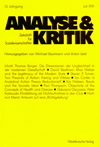Der ökonomische Ansatz in den Sozialwissenschaften I

1988 (10) Issue 2
Editorial
Die Überzeugungskraft und der Erfolg des ökonomischen Ansatzes ist wesentlich verbunden mit seinem methodologischen Individualismus und seiner Theorie der rationalen Entscheidung: 1. Komplexe soziale Tatsachen werden erklärt durch Zurückführung auf ein einheitliches Fundament, dessen elementare Bedeutung für jedermann nachvollziehbar ist: auf individuelle Entscheidungen, die Menschen in bestimmten Situationen zwischen verschiedenen Handlungsmöglichkeiten treffen. 2. Diese Entscheidungen w...
Table of Contents
Title: Die neue Welt der Ökonomie
Author: Gebhard Kirchgässner
Page: 107-137
Abstract: The article starts out with a sketch of the model of individual behaviour, basic for modern economic theory, including the consideration of typical criticisms. The model then is examined in its application first to micro- and macroeconomic theorizing, then to the economic analysis of politics and of law. It concludes by pointing out some drawbacks inherent in the economic approach to the social sciences: economic imperialism, conservativism and the illusion of manageability.
Title: Rational Choice and Moral Order
Author: Viktor Vanberg / James M. Buchanan
Page: 138-160
"The problem which science has to solve here consists in the explanation of a social phenomenon, of a homogeneous way of acting on the part of the members of a community for which public motives are recognizable, but for which in the concrete case individual motives are hard to discern." (Carl Menger 1985, 152)
Abstract: The article discusses some of the fundamental conceptual and theoretical aspects of rational choice and moral order. A distinction is drawn between constitutional interests and compliance interests, and it is argued that a viable moral order requires that the two interests somehow be brought into congruence. It is shown that with regard to the prospects for a spontaneous emergence of such congruence, a distinction between two kinds of moral rules which we call trust-rules and solidarity-rules is of crucial importance.
Title: The Limits of Homo Economicus in Public Choice and in Political Philosophy
Author: Karen I. Vaughn
Page: 161-180
Abstract: his paper argues that there are areas of political behavior for which the usual assumption of wealth maximizing homo economicus is to narrow to generate convincing explanation of behavior. In particular, it is argued that for many political decisions, people choose according to some set of moral preconceptions while for others, people have insufficient information to make economic choices even if they were inclined to do so. This implies that normative public choice can only be part of a political decision process in which non-pecuniary concerns influence choices. Finally, constitutional economics insofar as it is conceptually conceived, must presume some set of moral and informational properties of the parties to the social contract.
Title: Ein ipsatives Modell menschlichen Verhaltens. Ein Beitrag zur Ökonomie und Pyschologie
Author: Bruno S. Frey
Page: 181-205
Abstract: Human beings under some conditions tend to systematically overestimate their possibilities, under others to underestimate what is possible for them. This behaviour can be explained by differentiating between an ipsative possibility set (which includes what individuals consider relevant for themselves) and an objective one. These two possibility sets do not necessarily coincide. The difference may firstly be due to psychological processes as well as factors such as tradition and ideology. The difference may secondly be strategically designed by the individuals themselves knowing that they otherwise reach less utility. The approach stresses that it is essential to determine the possibility sets within which individuals rationally decide between alternatives.
Title: Reason and Morality in the Age of Nuclear Deterrence
Author: Jan Narveson
Page: 206-232
Abstract: The argument in this paper is that althaugh rationality and morality are distinguishable concepts, there is nevertheless a rational morality, a set of principles, namely, which it is rational of all to require of all. The argument of this paper is that such a morality would certainly issue in a general condemnation of aggressive war. (Whether this also makes it irrational for States to engage in such activities is another, and not entirely settled, matter.) Correlatively, it would issue in a strong right of defense. Would this right be sufficient to include resort to nuclear deterrence, if need be? It is argued that the answer must be in the affirmative - although the question of 'need' is by no means settled in current circumstances.